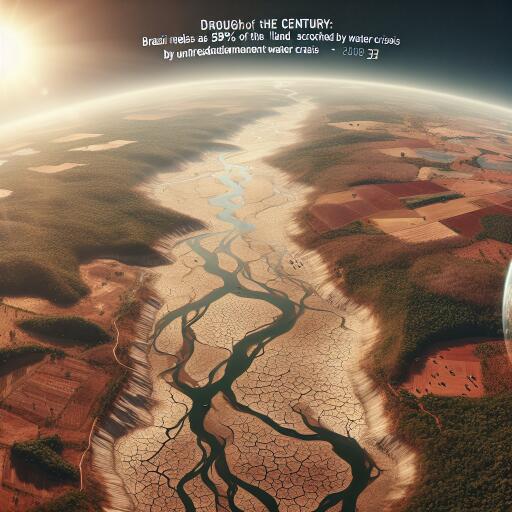
Drought of the Century: Brazil Reels as 59% of its Land Scorched by Unprecedented Water Crisis – News Directory 3
In an alarming environmental development, Brazil is witnessing a drought of colossal proportion, affecting a staggering 59% of its territorial expanse. The nation, known for its lush landscapes and vital ecosystems, is grappling with a crisis that stretches over 5 million square kilometers of its land. Reports from Brazil’s National Natural Disaster Monitoring and Warning Center highlight the severity of this year’s drought, underscoring an urgent need for intervention.
The repercussions of the drought extend beyond parched lands, as fire becomes an all-too-common occurrence. Recent studies by the Environmental Satellite Applications Laboratory at the Federal University of Rio de Janeiro have documented the destruction of approximately 3 million hectares due to wildfires in just the last quarter. The Pantanal, one of the most bio-diverse regions in the world, is recording fire incidents at an alarmingly high rate, significantly more than those documented in the previous year.
The spread of smoke from these fires is causing a substantial decline in air quality across several regions. The Brazilian National Institute for Space Research has noted that smoke from the wildfires blankets nearly 5 million square kilometers, leading to numerous flight cancellations, particularly in the northwestern state of Rondonia. Local authorities are being forced to issue health advisories, urging the populace to minimize outdoor activities due to hazardous air conditions.
Compounding the ecological crisis, the Amazon basin, known as the lung of the Earth, is experiencing unprecedented reductions in river water levels. The Brazilian Geological Survey has reported historic lows in the levels of the Madera, Acre, and Solimões rivers, with the Madeira River marking its lowest since record-keeping began in 1967. This dramatic decrease in water levels is indicative of the broader environmental challenges facing the region.
Analysts cite a combination of natural phenomena like El Niño and human-induced factors, including rampant deforestation and unchecked use of fire for clearing land, as the primary contributors to this extensive drought. The synergy of these elements accelerates the degradation of Brazil’s natural resources and habitats, posing severe threats to biodiversity and human livelihoods alike.
In response to the escalating situation, the Brazilian government, led by President Luiz Inácio Lula da Silva, has pledged immediate action. President Lula’s visit to the Amazon was marked by the announcement of significant investment totalling 500 million reais (around US$89.85 million) dedicated to river dredging initiatives and the revival of infrastructure projects, such as the construction of a key roadway linking Manaus to Porto Velho. This development strategy aims to mitigate the transport and logistical challenges imposed by the drought, highlighting the government’s commitment to addressing this environmental emergency.
The current drought in Brazil stands as a stark reminder of the vulnerability of our global ecosystems to both natural and anthropogenic pressures. It underscores the necessity for concerted efforts in environmental conservation and sustainable management practices, aiming to safeguard the future of the planet’s most precious resources.





Leave a Reply